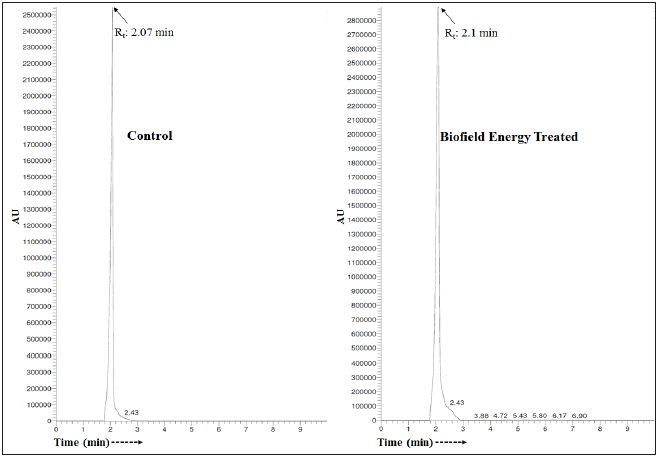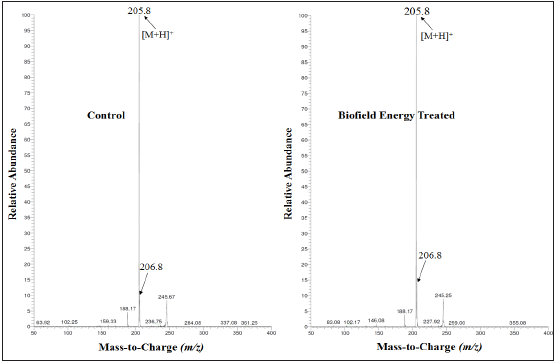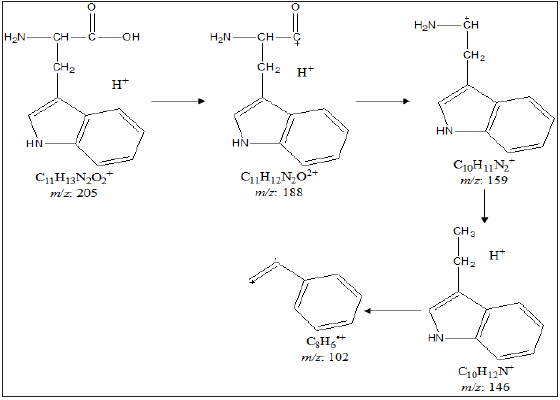- Submissions

Full Text
COJ Technical & Scientific Research
Isotopic Abundance Ratio Analysis of Biofield Energy Healing Treated L-Tryptophan Using LC-MS Spectrometry
Alice Branton1*, Mahendra Kumar Trivedi1, Dahryn Trivedi1 and Snehasis Jana2
1Trivedi Global, Inc., Henderson, USA
2Trivedi Science Research Laboratory Pvt. Ltd., Thane (West), Maharashtra, India
*Corresponding author: Alice Branton, Trivedi Global, Inc., Henderson, USA
Submission: December 07, 2020; Published: January 21, 2021

Volume3 Issue3January, 2021
Abstract
L-tryptophan is an essential α-amino acid, necessary for the normal growth in newborns, nitrogen balance in adults, protein synthesis, precursor of serotonin, melatonin, niacin, and albeit inefficiently in human, also the precursor of indole alkaloids and auxins in plants. This current study was designed to investigate the impact of The Trivedi Effect®-Biofield Energy Healing Treatment on the structural properties and the isotopic abundance ratio of L-tryptophan using LC-MS analytical technique. L-tryptophan sample was divided into two parts, one part of L-tryptophan was considered as the control sample (no Biofield Energy Treatment was provided), while the second part was treated with The Trivedi Effect®-Consciousness Energy Healing Treatment remotely by a renowned Biofield Energy Healer, Alice Branton and termed as the treated sample. The mass spectra of both the control and treated samples with respect to the chromatographic peak at retention time (Rt) 2.1 minutes exhibited the mass of the molecular ion peak adduct with hydrogen ion at m/z 205.08 (calcd for C11H13N2O2 +, 205.1), along with low molecular fragmented mass peaks at m/z 188, 159, and 102 for C11H12N2O2+, C10H11N2 + and C8H6+, respectively were also observed. The isotopic abundance ratio of PM+1/PM (2H/1H or 13C/12C or 15N/14N or 17O/16O) in the treated L-tryptophan was significantly increased by 35% compared with the control sample. Hence, the 13C, 2H, 15N, and 17O contributions from C11H13N2O2+ to m/z 206.08 in the treated L-tryptophan was significantly increased compared to the control sample. It could be hypothesized that the changes in the isotopic abundance and mass peak intensities due to the modification in nuclei possibly through the interference of neutrino particles using The Trivedi Effect®-Consciousness Energy Healing Treatment. The treated L-tryptophan with increased stable isotopic abundance ratio might have changed the physicochemical properties with higher force constant in the molecule. The new form of treated L-tryptophan would be a better and more stable in the supplements, nutraceutical, and pharmaceutical formulations, which would be advantageous for the prevention and treatment of pellagra, depression, kynurenine. It could also maintain the normal label of tryptophan and avoid increase of its metabolite, lower the neurotoxin and a metabotoxin behavior, glutaric aciduria type I (glutaric acidemia type I) disorder, eosinophilia-myalgia syndrome (EMS), incurable and sometimes fatal flu-like neurological condition, etc. As tryptophan is the precursor for the plant hormones like indole alkaloids and auxins, hence, this treated L-tryptophan would be advantageous for the improvement of yield, productivity, and quality of crops and other plants.
Keywords: L-tryptophan; The Trivedi effect®; Biofield energy; Consciousness energy healing treatment; LC-MS
Introduction
L-tryptophan [C11H12N2O2] is an essential α-amino acid, which must be obtained
from the diet and supplements. It is necessary for normal growth in new-borns, nitrogen
balance in adults, protein synthesis, a precursor of serotonin, melatonin, niacin, and albeit
inefficiently in human. It is also the precursor of indole alkaloids and auxins in plants [1,2]. It
is converted to 5-hydroxy-tryptophan (5-HTP), which increase the production of serotonin,
a neurotransmitter essential in regulating sleep, appetite, mood, temperature, sexual
behavior, and pain [1,3]. Sources for tryptophan are red meat, eggs, fish, poultry, brown
rice, soybeans, chocolate, oats, dried dates, milk, yogurt, cottage cheese, sesame, chickpeas,
almonds, sunflower seeds, pumpkin seeds, buckwheat, spirulina, peanuts, etc. [1,2]. The daily
requirement of tryptophan for adults is 3mg/kg/day. The tryptophan and protein requirement
decreases with age. Improper diet, high maize or other tryptophan-deficient diets, fructose malabsorption, Hartnup’s disease, etc. are the cause for reduced
levels of tryptophan in the blood. Tryptophan deficient can be the
cause of pellagra; the other deficiency diseases are depression and
kynurenine. Under certain situations if the label of tryptophan
and its metabolite increase, it can behave like a neurotoxin and a
metabotoxin, glutaric aciduria type I (glutaric acidemia type I)
disorder, eosinophilia-myalgia syndrome (EMS), create an incurable
and sometimes fatal flu-like neurological condition, etc. [1,2,4-8].
L-tryptophan is slightly soluble in water, very slightly soluble in
alcohol, practically insoluble in ether and chloroform. On heat to
decompose it emits toxic fumes of nitric oxide [1].
The physicochemical properties of L-tryptophan are very
important for the supplements, nutraceutical/ pharmaceutical, and
other industries. The quality and efficiency of a pharmaceutical/
nutraceutical formulation depend upon the physicochemical
properties of the substance, which is a challenging task for the
scientific communities [9]. In this scenario, The Trivedi Effect®-
Consciousness Energy Healing Treatment have the astonishing
capabilities to transform the properties of many living and nonliving
object(s) [10-14]. The Trivedi Effect® is a natural and only
scientifically proven phenomenon in which a person can harness
this inherently intelligent energy from the Universe and transmit
it anywhere on the planet through the possible mediation of
neutrinos [15]. Every living organism possesses a unique infinite,
para-dimensional electromagnetic energy field surrounding the
body known as Biofield Energy. The Biofield Energy Healers
can harness the energy from the “Universal Energy Field” and
can transmit into any living or non-living object(s), which is
known as the Biofield Energy Healing Treatment. There are
several Biofield based Energy Healing Therapies that are used
nowadays against various disease conditions [16-18]. Biofield
Energy Healing therapy has been recognized worldwide as a
Complementary and Alternative Medicine (CAM) health care
approach by National Center of Complementary and Integrative
Health (NCCIH) with other therapies, medicines and practices such
as Ayurvedic medicine, traditional Chinese herbs and medicines,
homeopathy, yoga, chiropractic/osteopathic manipulation, Qi
Gong, Tai Chi, meditation, acupressure, acupuncture, healing
touch, hypnotherapy, naturopathy, Reiki, cranial sacral therapy,
etc., [19]. These are the therapies have been well accepted by most
of the U.S.A. population with several advantages [20]. The Trivedi
Effect®- Consciousness Energy Healing Treatment (Biofield Energy
Healing Treatment) also reported with significant results altering
the physicochemical properties of chemicals, metals, ceramics
and polymers [21-24], transformed antimicrobial properties
[25,26], improved agricultural crop yield, productivity, and quality
[10,11,27], improved skin health [28,29], improved the cancer in
cancer cell line [30], improved bioavailability of pharmaceutical
and nutraceutical compounds [31,32], and altered the isotopic
abundance ratio [33,34].
Study of the natural stable isotope ratio analysis has many
applications in the different field to understand the isotope
effects resulting from the alterations of the isotopic composition
[35-37]. Gas chromatography-mass spectrometry (GC-MS) and
liquid chromatography mass spectrometry (LC-MS) are the
widely used sophisticated analytical techniques for the analysis
of isotope ratio with sufficient precision [36]. The Trivedi Effect®-
Consciousness Energy Healing Treatment could be an economical
approach to obtain a better desirable L-tryptophan with improved
physicochemical properties for the supplements, nutraceutical, and
pharmaceutical formulations. Therefore, this study was designed
and evaluated the impact of The Trivedi Effect®-Consciousness
Energy Healing Treatment on L-tryptophan using LC-MS for the
structural characterization and the isotopic abundance ratio of
PM+1/PM (2H/1H or 13C/12C or 15N/14N or 17O/16O) compared to the
control sample.
Material and Methods
Chemicals and reagents
L-tryptophan (>99%) was purchased from Alfa Aesar, India. All other chemicals used during the experiments were of analytical grade available in India.
Consciousness energy healing treatment strategies
The L-tryptophan powder sample was the test sample divided into two parts. One part of the test sample was considered as a control sample (no Biofield Energy Treatment was provided). However, the other part of the test sample was exposed to The Trivedi Effect®-Consciousness Energy Healing Treatment remotely under standard laboratory conditions for 3 minutes and known as The Trivedi Effect® Treated (Biofield Energy Treated) L-tryptophan. The Biofield Energy Treatment was provided through the healer’s unique energy transmission process by the renowned Biofield Energy Healer, Alice Branton, USA, to the test sample. Further, the control sample was treated with “sham” healer for the better comparison. However, the sham healer did not have any knowledge about the Biofield Energy Treatment. After that, the Biofield Energy Treated and un-treated L-tryptophan samples were kept in sealed conditions and characterized using LC-MS analytical techniques.
Characterization
Liquid Chromatography-Mass Spectrometry (LC-MS) Analysis
and Calculation of Isotopic Abundance Ratio
The liquid chromatography-mass spectrometric analysis of the
control and Biofield Energy Treated L-tryptophan was carried out
with the help of LC-MS Thermo Fisher Scientific, the USA equipped
with an ion trap detector connected with a triple-stage quadrupole
mass spectrometer. The column used here was a reversed phase
Thermo Scientific Synchronis C18 (Length-250mm X ID 4.6mm X
5 micron), maintained at 25 ˚C. The diluent used for the sample preparation was methanol. The L-tryptophan solution injection
volume was 10μL and the analyte was eluted using acetonitrile
(80%) + 0.1% formic acid (20%) pumped at a constant flow rate of
1mL/min. Chromatographic separation was achieved using gradient
condition and the total run time was 10min. Peaks were monitored
at 278nm using the PDA detector. Mass spectrometric analysis was
performed under ESI +ve ion mode. The total ion chromatogram,
peak area % and mass spectrum of the individual peak which
was appeared in LC along with the full scan (m/z 50-400) were
recorded. The total ion chromatogram and mass spectrum of the
individual peak (appeared in LC-MS) were recorded.
The natural abundance of each isotope (C, H, N, and O) can be
predicted from the comparison of the height of the isotope peak
with respect to the base peak. The values of the natural isotopic
abundance of the common elements are obtained from the literature
[38-40]. The LC-MS based isotopic abundance ratio (PM+1/PM) for
the control and Biofield Energy Treated L-tryptophan (C11H13N2O2
+) was calculated.
Percentage (%) change in isotopic abundance ratio =
[(IARTreated – IARControl)/ IARControl) x 100]
Where IARTreated = isotopic abundance ratio in the treated
sample and IARControl = isotopic abundance ratio in the control
sample.
Result and Discussion
Liquid Chromatography-Mass Spectrometry (LC-MS)
The control and Biofield Energy Treated L-tryptophan showed a single prominent peak at retention time (Rt) of 2.1 minutes in the LC-SM chromatograms (Figure 1). This result indicated that the sample is pure and polarity of both the samples was similar to each other. The mass spectra of both the control and Biofield Energy Treated samples of L-tryptophan are presented in (Figure 2). The mass spectra of both the samples at Rt of 2.1 minutes exhibited the presence of the molecular ion of L-tryptophan adduct with hydrogen ion at m/z 205.08 (calcd for C11H13N2O2 +, 205.1), along with low molecular fragmented mass peaks at m/z 188, 159, and 102 for C11H12N2O2+, C10H11N2 +, and C8H6 +, respectively were observed both in the control and Biofield Energy Treated L-tryptophan (Figure 3). The fragmentation pattern of the experimental data was well supported by the published literature data [41].
Figure 1: Liquid chromatograms of the control and Biofield Energy Treated L-tryptophan.

Figure 2: Mass spectra of the control and Biofield Energy Treated L-tryptophan at Rt 2.1 minutes.

Figure 3: Proposed fragmentation pattern of L-tryptophan.

Isotopic abundance ratio analysis
The control and Biofield Energy Treated L-tryptophan samples showed the mass of a molecular ion at m/z 205.08 (calcd for C11H13N2O2 +, 205.1) with 100% relative abundance in the spectra. The theoretical calculation of isotopic peak PM+1 for the protonated L-tryptophan presented as below:
P (13C) = [(11 x 1.1%) x 100% (the actual size of the M+ peak)]
/ 100% = 12.1%
P (2H) = [(13 x 0.015%) x 100%] / 100%= 0.195%
P (15N) = [(2 x 0.4%) x 100%] / 100% = 0.8%
P (17O) = [(2 x 0.04%) x 100%] / 100% = 0.08%
PM+1 i.e. 13C, 2H, 15N, and 17O contributions from C11H13N2O2
+ to
m/z 206.08 = 13.18%
The calculated isotopic abundance of PM+1 value 13.18% was near to the experimental values (Table 1). From the above calculation, it has been found that 13C and 15N have the major contribution to m/z 206.08.
Table 1: LC-MS based isotopic abundance analysis results in Biofield Energy Treated L-tryptophan compared to the control sample.

The LC-MS based isotopic abundance ratio analysis PM and PM+1 for L-tryptophan near m/z 205.08 and 206.08, respectively of the control and Biofield Energy Treated samples, which were obtained from the observed relative peak intensities of [M+] and [(M+1) +] peaks, respectively in the mass spectra (Table 1). The isotopic abundance ratio of PM+1/PM (2H/1H or 13C/12C or 15N/14N or 17O/16O) in Consciousness Energy Healing Treated L-tryptophan was significantly increased by 35% compared to the control sample (Table 1). Thus, the 13C, 2H, 15N and 17O contributions from C11H13N2O2+ to m/z 206.08 in the Biofield Energy Treated sample was significantly increased compared to the control sample.
LC-MS study confirmed the structure of the sample as L-tryptophan. The isotopic abundance ratio of PM+1/PM (2H/1H or 13C/12C or 15N/14N or 17O/16O) in the Biofield Energy Treated L-tryptophan was significantly increased compared to the control sample. The Trivedi Effect®-Consciousness Energy Healing Treatment might have the impact on nuclei of L-tryptophan possibly via the mediation of neutrino particles would be the solid cause behind the change in the isotopic abundance ratio [15,33,34]. A neutrino is an elementary particle that interacts only via the weak subatomic force and gravity. The properties to change identities which are only possible if the neutrinos possess mass and have the ability to interchange their phase from one phase to another internally. Therefore, the neutrinos have the ability to interact with protons and neutrons in the nucleus, which indicated a close relation between neutrino and the isotope formation [36,37]. The altered isotopic composition in molecular level of The Trivedi Effect®-Consciousness Energy Healing Treated L-tryptophan might have altered the neutron to proton ratio in the nucleus. The Biofield Energy Treated L-tryptophan with increased stable isotopic abundance ratio, might have changed the physicochemical properties with higher force constant with the atoms of the L-tryptophan. The Biofield Energy Treated L-tryptophan with improved physicochemical properties would be more desirable for the supplements, nutraceutical, and pharmaceutical formulations, which would be advantageous for the prevention and treatment of pellagra, depression, kynurenine. It could also maintain the normal label of tryptophan and avoid increase of its metabolite, lower the neurotoxin and a metabotoxin behavior, glutaric aciduria type I (glutaric acidemia type I) disorder, eosinophilia-myalgia syndrome (EMS), incurable and sometimes fatal flu-like neurological condition, etc. Tryptophan is the precursor for the plant hormones like indole alkaloids and auxins. Therefore, this Biofield Energy Treated L-tryptophan would be advantageous for the improvement of yield, productivity, and quality of crops.
Conclusion
The Trivedi Effect®-Consciousness Energy Healing Treatment (Biofield Energy Treatment) showed the substantial impact on the isotopic abundance ratio of L-tryptophan. The LC-MS spectra of both the control and Biofield Energy Treated samples with respect to the chromatographic peak at retention time (Rt) 2.1 minutes exhibited the mass of the molecular ion peak adduct with hydrogen ion at m/z 205.08 (calcd for C11H13N2O2 +, 205.1), along with low molecular fragmented mass peaks at m/z 188, 159, and 102 for C11H12N2O2 +, C10H11N2 +, and C8H6 +, respectively were also observed. The isotopic abundance ratio of PM+1/PM (2H/1H or 13C/12C or 15N/14N or 17O/16O) in the Biofield Energy Treated L-tryptophan was significantly increased by 35% compared with the control sample. Hence, the 13C, 2H, 15N and 17O contributions from C11H13N2O2 + to m/z 206.08 in the Biofield Energy Treated L-tryptophan was significantly increased compared to the control sample. It could be hypothesized that the changes in the isotopic abundance and mass peak intensities due to the modification in nuclei possibly through the interference of neutrino particles using The Trivedi Effect®- Consciousness Energy Healing Treatment. The Biofield Energy Treated L-tryptophan with increased stable isotopic abundance ratio, might have changed the physicochemical properties with higher force constant in the molecule. The new form of Biofield Energy Treated L-tryptophan would be a better and more stable in the supplements, nutraceutical, and pharmaceutical formulations, which would be advantageous for the prevention and treatment of pellagra, depression, kynurenine. It could also maintain the normal label of tryptophan and avoid increase of its metabolite, lower the neurotoxin and a metabotoxin behavior, glutaric aciduria type I (glutaric acidemia type I) disorder, eosinophilia-myalgia syndrome (EMS), incurable and sometimes fatal flu-like neurological condition, etc. As tryptophan is the precursor for the plant hormones like indole alkaloids and auxins, hence, this Biofield Energy Treated L-tryptophan would be advantageous for the improvement of yield, productivity, and quality of crops and other plants. 6
Acknowledgement
The authors are grateful to Sophisticated Instrumentation Centre for Applied Research & Testing (SICART) India, Trivedi Science, Trivedi Global, Inc., Trivedi Testimonials, and Trivedi Master Wellness for their assistance and support during this work.
References
- https://pubchem.ncbi.nlm.nih.gov/compound/L-tryptophan#section.
- https://en.wikipedia.org/wiki/Tryptophan.
- Timothy CB (1998) 5-Hydroxytryptophan: A clinically effective serotonin precursor. Altern Med Rev 3(4): 271-280.
- Joanne H (2018) USDA National Nutrient Database for Standard Reference, Release 22. Nutrient Data Laboratory, Agricultural Research Service, United States Department of Agriculture, Washington DC, USA.
- Ledochowski M, Widner B, Murr C, Sperner UB, Fuchs D (2001) Fructose malabsorption is associated with decreased plasma tryptophan. Scand J Gastroenterol 36(4): 367-371.
- Ledochowski M, Sperner UB, Widner B, Fuchs D (1998) Fructose malabsorption is associated with early signs of mental depression. Eur J Med Res 3(6): 295-298.
- Allen JA, Peterson A, Sufit R, Hinchcliff ME, Mahoney JM, et al. (2011) Post-epidemic eosinophilia-myalgia syndrome associated with L-tryptophan. Arthritis Rheum 63(11): 3633-3639.
- Pusti S, Das N, Nayek K, Biswas S (2014) A treatable neurometabolic disorder: Glutaric aciduria type 1. Case Reports in Pediatrics 2014: 1-3.
- Yadav AV, Yadav VB (2008) Designing of pharmaceuticals to improve physicochemical properties by spherical crystallization technique. Journal of Pharmacy Research 1(2): 105-110.
- Trivedi MK, Branton A, Trivedi D, Nayak G, Gangwar M, et al. (2015) Morphological and molecular analysis using RAPD in biofield treated sponge and bitter gourd. American Journal of Agriculture and Forestry 3(6): 264-270.
- Trivedi MK, Branton A, Trivedi D, Nayak G, Bairwa K, et al. (2015) Physical, thermal, and spectroscopic characterization of biofield energy treated Murashige and Skoog plant cell culture media. Cell Biology 3(4): 50-57.
- Trivedi MK, Patil S, Shettigar H, Mondal SC, Jana S (2015) The potential impact of biofield treatment on human brain tumor cells: A time-lapse video microscopy. J Integr Oncol 4(3): 1-5.
- Branton A, Jana S (2017) Effect of the biofield energy healing treatment on the pharmacokinetics of 25-hydroxyvitamin D3 [25(OH)D3] in rats after a single oral dose of vitamin D3. American Journal of Pharmacology and Phytotherapy 2(1): 11-18.
- Trivedi MK, Branton A, Trivedi D, Nayak G, Sethi KK, et al. (2016) Isotopic abundance ratio analysis of biofield energy treated indole using gas chromatography-mass spectrometry. Science Journal of Chemistry 4(4): 41-48.
- Trivedi MK, Mohan TRR (2016) Biofield energy signals, energy transmission and neutrinos. American Journal of Modern Physics 5(6): 172-176.
- Rubik B, Muehsam D, Hammerschlag R, Jain S (2015) Biofield science and healing: History, terminology and concepts. Global Advances in Health and Medicine 4: 8-14.
- Warber SL, Cornelio D, Straughn J, Kile G (2004) Biofield energy healing from the inside. J Altern Complement Med 10(6): 1107-1113.
- Movaffaghi Z, Farsi M (2009) Biofield therapies: biophysical basis and biological regulations? Complement Ther Clin Pract 15(1): 35-37.
- Koithan M (2009) Introducing complementary and alternative therapies. J Nurse Pract 5(1): 18-20.
- Barnes PM, Bloom B, Nahin RL (2008) Complementary and alternative medicine use among adults and children: United States, 2007. Natl Health Stat Report 10(12): 1-23.
- Trivedi MK, Branton A, Trivedi D, Nayak G, Panda P, et al. (2016) Evaluation of the isotopic abundance ratio in biofield energy treated resorcinol using gas chromatography-mass spectrometry technique. Pharm Anal Acta 7(5): 2-7.
- Dabhade VV, Tallapragada RMR, Trivedi MK (2009) Effect of external energy on the atomic, crystalline and powder characteristics of antimony and bismuth powders. Bulletin of Materials Science 32: 471-479.
- Trivedi MK, Nayak G, Patil S, Tallapragada RM, Latiyal O (2015) Studies of the atomic and crystalline characteristics of ceramic oxide nano powders after biofield treatment. Ind Eng Manage 4(3): 2-6.
- Trivedi MK, Nayak G, Patil S, Tallapragada RM, Mishra R (2015) Influence of biofield treatment on physicochemical properties of hydroxyethyl cellulose and hydroxypropyl cellulose. J Mol Pharm Org Process Res 3(2): 1-8.
- Trivedi MK, Branton A, Trivedi D, Nayak G, Mondal SC, et al. (2015) In vitro evaluation of biofield treatment on viral load against human immunodeficiency-1 and cytomegalo viruses. American Journal of Health Research 3(6): 338-343.
- Trivedi MK, Patil S, Shettigar H, Gangwar M, Jana S (2015) Antimicrobial sensitivity pattern of Pseudomonas fluorescens after Biofield Treatment. J Infect Dis Ther 3: 222.
- Trivedi MK, Branton A, Trivedi D, Nayak G, Gangwar M, et al. (2015) Agronomic characteristics, growth analysis, and yield response of biofield treated mustard, cowpea, horse gram, and groundnuts. International Journal of Genetics and Genomics 3: 74-80.
- Kinney JP, Trivedi MK, Branton A, Trivedi D, Nayak G, et al. (2017) Overall skin health potential of the biofield energy healing based herbomineral formulation using various skin parameters. American Journal of Life Sciences 5: 65-74.
- Singh J, Trivedi MK, Branton A, Trivedi D, Nayak G, et al. (2017) Consciousness energy healing treatment based herbomineral formulation: A safe and effective approach for skin health. American Journal of Pharmacology and Phytotherapy 2: 1-10.
- Trivedi MK, Patil S, Shettigar H, Gangwar M, Jana S (2015) In vitro evaluation of biofield treatment on cancer biomarkers involved in endometrial and prostate cancer cell lines. J Cancer Sci Ther 7: 253-257.
- Branton A, Jana S (2017) The influence of energy of consciousness healing treatment on low bioavailable resveratrol in male Sprague Dawley rats. International Journal of Clinical and Developmental Anatomy 3(3): 9-15.
- Branton A, Jana S (2017) The use of novel and unique biofield energy healing treatment for the improvement of poorly bioavailable compound, berberine in male Sprague Dawley rats. American Journal of Clinical and Experimental Medicine 5(4): 138-144.
- Trivedi MK, Branton A, Trivedi D, Nayak G, Panda P, et al. (2016) Isotopic abundance ratio analysis of 1,2,3-trimethoxybenzene (TMB) after biofield energy treatment (The Trivedi Effect®) using gas chromatography-mass spectrometry. American Journal of Applied Chemistry 4: 132-140.
- Trivedi MK, Branton A, Trivedi D, Nayak G, Sethi KK, et al. (2016) Evaluation of isotopic abundance ratio in biofield energy treated nitrophenol derivatives using gas chromatography-mass spectrometry. American Journal of Chemical Engineering 4: 68-77.
- Schellekens RC, Stellaard F, Woerdenbag HJ, Frijlink HW, Kosterink JG (2011) Applications of stable isotopes in clinical pharmacology. Br J Clin Pharmacol 72(6): 879-897.
- Muccio Z, Jackson GP (2009) Isotope ratio mass spectrometry. Analyst 134(2): 213-222.
- Weisel CP, Park S, Pyo H, Mohan K, Witz G (2003) Use of stable isotopically labeled benzene to evaluate environmental exposures. J Expo Anal Environ Epidemiol 13(5): 393-402.
- Rosman KJR, Taylor PDP (1998) Isotopic compositions of the elements 1997 (Technical Report). Pure and Appl Chem 70(1): 217-235.
- Smith RM (2004) Understanding mass spectra: A Basic Approach. (2nd edn), John Wiley & Sons Inc, Hoboken, New Jersey, USA.
- Jürgen H (2004) Gross mass spectrometry: A textbook. (2nd edn), Springer, Berlin, Germany.
- Jiang P, Dai W, Yan S, Chen Z, Xu R, et al. (2011) Potential biomarkers in the urine of myocardial infarction rats: A metabolomic method and its application. Mol Biosyst 7: 824-831.
© 2021 Alice Branton. This is an open access article distributed under the terms of the Creative Commons Attribution License , which permits unrestricted use, distribution, and build upon your work non-commercially.
 a Creative Commons Attribution 4.0 International License. Based on a work at www.crimsonpublishers.com.
Best viewed in
a Creative Commons Attribution 4.0 International License. Based on a work at www.crimsonpublishers.com.
Best viewed in 







.jpg)






























 Editorial Board Registrations
Editorial Board Registrations Submit your Article
Submit your Article Refer a Friend
Refer a Friend Advertise With Us
Advertise With Us
.jpg)






.jpg)














.bmp)
.jpg)
.png)
.jpg)










.jpg)






.png)

.png)



.png)






